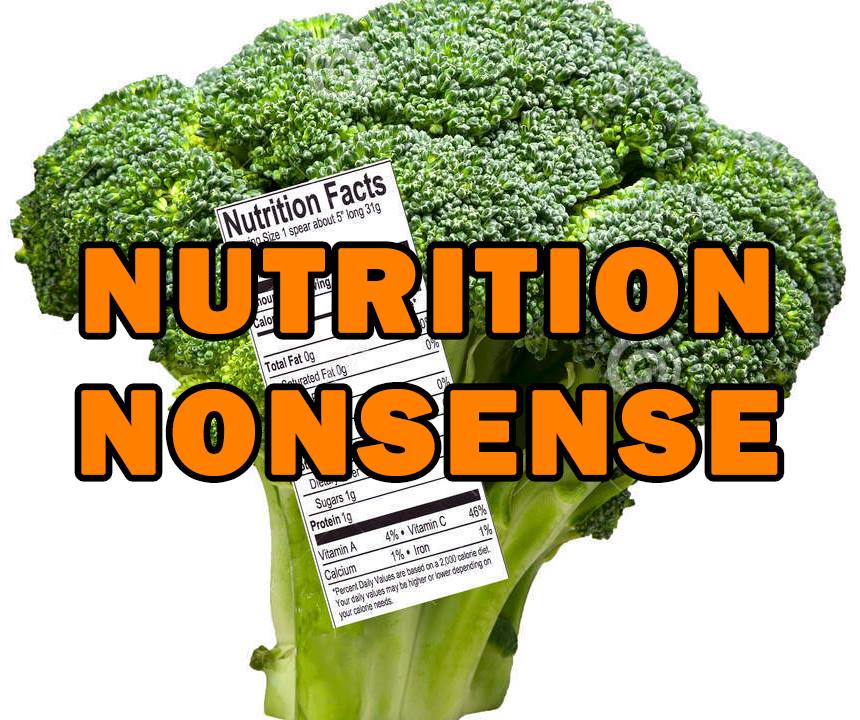After a chemical analysis and on paper, most vegetables, nuts, seeds and fruits look like they contain some vitamins, minerals and even protein. Unfortunately for us, we do not have the complex digestion and fermentation chambers of herbivores. While vitamins and minerals are in chemical form, which cannot be absorbed by humans and need to be converted, other problems also arise, such as antinutrients, fiber, and poisonous plant defense chemicals.
The bioavailability and bioconversion rate of vitamins and minerals in plant foods are extremely low, in the neighborhood of 4 to 12 percent. So, right off the bat, you can multiply that label claim with .1 to get a fair idea of what you may be able to absorb. For example, 100 grams of toxic broccoli is said to contain about 288 mg of potassium, so you might get 25 mg if lucky. However, we have not yet adjusted for antinutrients such as phytic acid, oxalates and goitrogens, which bind to most minerals and make them useless. Another group of antinutrients are inhibitors like tannins, phytates, trypsin inhibitors, lucosinolates, and isothiocyanates, which bind to starch and protein to form complexes that our body cannot absorb. Same with fiber, it binds up protein and starch. In other words, protein claims in plant-based foods can be reduced to about 50 to 70 %. If 100 grams of Black Beans contain 21g of protein, your body will only be able to absorb about 6 to 11 grams, and even less if your digestive system is compromised. And, keep in mind, that is 6 to 11 grams of very poor quality protein with a hideous amino acid profile.


And if you boil, soak, sprout and rinse plant foods to reduce the content of antinutrients, some of the little nutrition that actually is present will be destroyed while most of the toxins will remain (and some may increase as you actually make them more available), rendering the unpalatable crap even more useless. And again, the little nutrition that might be in a plant is not really bioavailable and need to be converted, which is a costly mechanism. When you take all this into consideration, any kind of plant food or food made from plants are totally worthless as nutrition. Most of them simply provide calories in the form of macronutrients (mainly sugars) – unfortunately, they do so by simultaneously poisoning us with toxic chemicals and antinutrients.
Any way you look at it, vegetables, nuts, seeds, grains, fruits and other plant foods are not only toxic, they are also an extremely poor choice for nutrition. We humans, as facultative carnivores, have the ability to survive on plant foods for short amounts of time (depending on your starting nutrition stores). And that is mostly from extracting some sugar for energy from the plant foods. That is why vegans say they feel high when starting out, because it’s just like a very slow paced fast, and your body starts to consume itself. It’s the same “high” you get when fasting, although more intense. So, yes, if you had adequate nutrition stores to begin with, you can survive, while deteriorating, for quite some time on a varied plant-based diet. But surviving is a far cry from living and especially thriving! And some of the damage done from that kind of starvation can not be undone!
The only source of bioavailable vitamins, fat soluble vitamins, minerals, vitamin A, vitamin K2 (M4), EPA/DHA, heme iron, cholesterol, taurine, vitamin B12, and much more, are foods from the animal kingdom. These nutrients do not even exist in plants. Read that again. They do not exist in plants!
If you don’t eat animal foods on a daily basis, you are robbing yourself of vital nutrients and you will pay the price further down the road in the form of modern diseases, premature aging/deterioration, brittle teeth, hair loss, brain fog, muscle atrophy, a ton of other health problems and a heavily reduced life span.
In vegans we see this in just a few months or years, depending on their previous nutritional status. I’ve helped more than 50 ex-vegans to regain their health and I have seen the damage first hand. it’s not pretty. In vegetarians we see this after a few years, depending on their food choices. And in those following a typical western diet, we see several types of malnutrition and illness across the board.
To conclude, do not pay any attention to nutrition labels on any kind of plant-based food. It’s an illusion. The same goes for every worthless app or software that uses these nutritional databases, such as cronometer.
And if you for some reason want to include a bit of plant-based food in your meals, forget about their nutritional value. They only provide sugars and maybe a tiny bit of incomplete protein and some harmful fiber. You might absorb 50 to 90 % of the sugars and 30 to 70 % of the proteins. The more fiber, the less macronutrients you’ll absorb.
